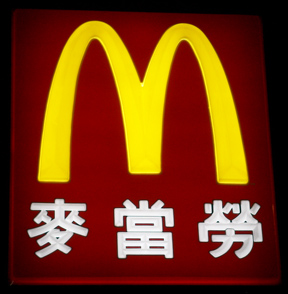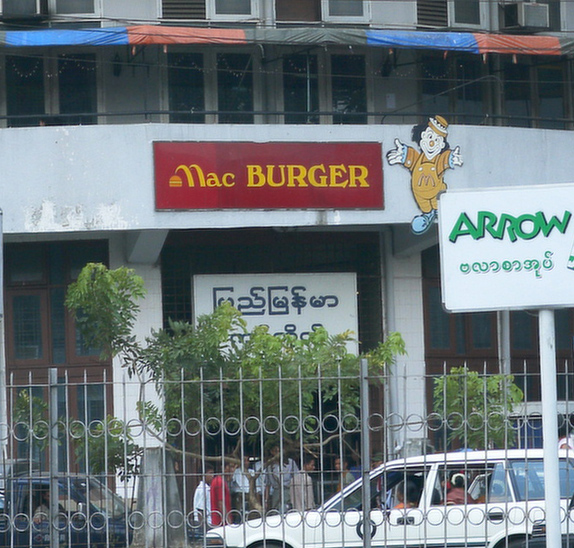
McDonald’s of Macao sign. © 2003, James A. Clapp
In the McDonalds in this western area of Beijing I am upstairs eating with ye-ye’s, ba-ba’s and kids and grandkids on a Saturday morning. Under the din I can hear the refrains of the Carpenters, singing, in English of course, “We’ve only just begun / to live. / White lace and promises / A kiss for luck and we’re on our way. / And yes, We’ve just begun.” The incongruity is almost dizzying. These people don’t understand a word of it and, I am likely to be the only person who knows that nobody needed a big Mac and super-sized fries more than Karen Carpenter, who sadly, starved herself to death.
But then, this was a few years ago, when there were fewer McDonalds establishments in China and the marketing invasion had “only just begun.” Now they are everywhere; just turn left at the Starbucks. Maybe they didn’t understand the lyrics but, technically, they were warned by the Carpenters.
Even before “globalization” came into our common lexicon American super-brands had been employed as a form of shorthand for the cultural adulteration that comes with the marketing power of international corporations. Coke may well have been the first, with Coco-colonizaton referring to the addictive advantages of the soft drink from Georgia over local beverages, be they tea, coffee, beer, saki, kvass, whatever. Coke could be dispensed from anywhere, an one needs only to take a ride into the countryside in India, for only one example, to gauge its ubiquity; coke signs abound, even being used as the siding and roofing for otherwise primitive structures. Any mean little shop can dispense the stuff. Coke knows “distribution.”
McDonald’s took American brand invasion to foreign cultures to a new level. Big Macs need to be made on the spot, hot and fresh. And then there’s the fries, which McDonald’s has figured out is the real addictive item on their menu. The burgers and shakes and cones don’t compare with the fries. It’s not uncommon to see a bunch of Hong Kong kids in a McDonald’s with a mountain of fries on a tray six-inches high, snatching and catsup-dipping like a bunch of crack junkies in an abandoned warehouse. Unlike Coke, McDonald’s is a place , as well as a cuisine .[1] It has air-conditioning, napkins and clean surfaces, bright lighting, and clean restrooms.Ask any American package tourist why they went all the way to China, or even to France or Spain, to end up in a McDonalds, and they will tell you about the clean restrooms .
But the cultural invasion has not been without its cultural integration. McDonalds has learned that you can’t just shove Big Macs down people’s throats in other countries. For a time I collected menus from different McDonalds around the world. [2] One can see that they have conceded to local customs and tastes. There was the issue of India, for example, where they don’t like to grind up their cows, fry them and stick them between buns (which would be equivalent in America to having an Apostle-Burger). So they developed veggie-burgers chicken-burgers. In other places there are side dishes, salads, and sauces that bring familiar food items and tastes to share with those fries that do, indeed, seem to taste the same all over the world.
American tourists might also get a smile when cute greeters meet you at the door and escort you to the shortest line (you won’t find that at a Mickey D’s in the Bronx) and then ferry your tray to an open table, all with a smile an no hand out for a tip.
World traveler and author Pico Iyer insists that MacDonald’s gets a bad rap abroad when they are chided for “sameness.” Iyer says there is great variety underneath the arches and color scheme. Chicken kata burgers in Japan, and spicy lentil dishes in Delhi give each Mickey’s a local translation. [3]
So what’s the beef [4] about the globalization of McDonalds. Some of it comes from Americans themselves; the standard grumble by travelers that indigenous cultures are being polluted by American uber -culture, part of the larger anti-globalization argument. Part of it comes from locals, certainly from the venders of local cuisine who find competing with this corporate monster from abroad impossible without access to the formula for secret sauce and those imported potatoes for those diabolical fries. [5] Both parties might be found venting their complaints near one another’s piles of fries at the local Mickey D’s. Some of it no doubt has to do with the negative feelings around the world about America these days. There is the nutrition argument that we are making fat, unhealthy kids in other countries just the way we do at home, and it is easy to see the effects of a Big Mac, super-sized fries, a Coke, followed Thomas Friedman has written “No two countries that both had McDonald’s had fought a war against each other since each got its McDonald’s.” [6] Friedman is one of the more influential voices of AntiDisMcDonaldizationism. Some might argue that they are all diabetics now or are too fat to fight. In any case, there apparently no Mickey D’s in Iraq, Iran or North Korea—the “Axis of Evil.” [7] There was one in Iran that lasted two days; calling that burger a Big Mohammad probably wasn’t a good idea.
Recently the furor over the economic and nutritional effects of McDonalds foreign franchises appears to have abated somewhat. But a new wave of DisMcDonaldsizationism will probably come into being, fomented by bearded revolutionaries who secretly pile mountains of fries in the shadowy corners of some Mickey D’s in a third world country. But, given the pendulums of political movements, it will likely be followed by a counter wave of Anti-DisMcDonaldsizationism. No, wait! A counter-counter movement would have to be called Neo -Anti-DisMcDonaldsizationism! Try saying that with a mouthful of fries.
And when the evening comes . . . we smile,
So much of life ahead
We’ll find a place where there’s room to grow,
And yes, We’ve just begun. [8]

Talk about trademark infringement.
In Rangoon they took the arches, Ronald, and the color scheme.
No wonder Burma is a pariah nation.
© 2001, UrbisMedia
___________________________________
©2007, James A. Clapp (UrbisMedia Ltd. Pub. 3.20.2007)
[1] STOP LAUGHING!
[2] Hey, I was doing important academic research; I had to be in those places. People snickered at my research on call girls, too. Anyway, the menus were the placemats, so I wasn’t stealing anything.
[3] Interview with RTHK, Hong Kong, 2007
[4] Sorry.
[5] Being a corporate monster always means your economic impact is greater. Currently, McDonalds, which uses a huge amount of input product is being chided for the paltry wages paid farm workers who harvest their vegetables. C’mon McDonalds, how are these workers going to super-size their fries?
[6] The Lexus and the Olive Tree (1999)
[7] http://en.wikipedia.org/wiki/List_of_countries_with_McDonald’s_franchises
[8] © Roger Nichols (music) and Paul Williams (lyrics)
